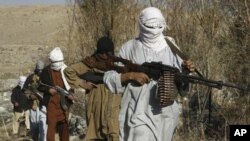President Barack Obama says the U.S.-led coalition is making progress in fighting al-Qaida and the Taliban in Afghanistan and Pakistan. The president talked with reporters Thursday about his administration's annual review of its policy in the region.
President Obama says problems remain, but U.S. and NATO forces have weakened al-Qaida's leaders and stopped the Taliban's momentum.
"This continues to be a very difficult endeavor," said President Obama. "But I can report that, thanks to the extraordinary service of our troops and civilians on the ground, we are on track to achieve our goals."
The president says al-Qaida leaders in tribal areas along the Afghanistan-Pakistan border are under more pressure today than at any point since they fled the region in 2001.
"Senior leaders have been killed," said Obama. "It is harder for them to recruit. It is harder for them to travel. It is harder for them to train. It is harder for them to plot and launch attacks. In short, al-Qaida is hunkered down."
Mr. Obama says progress has also been made in fighting the Taliban in Afghanistan. He says this is partly due to the U.S. pulling troops out of Iraq and committing more forces to Afghanistan, where the number of American service people has risen to about 100,000.
The president says the progress made so far will enable the U.S. to begin reducing its forces in Afghanistan as scheduled, in July, 2011. The plan calls for Afghans to be in full charge of their country's security by the end of 2014.
"In many places, the gains we have made are still fragile and reversible," he said. "But there is no question we are clearing more areas from Taliban control, and more Afghans are reclaiming their communities."
The policy review says one of the remaining challenges is to make those gains durable and sustainable. One obstacle has been the difficult relationship between the Obama administration and President Hamid Karzai's Afghan government, which some U.S. officials say is corrupt.
"Now, our review confirms, however, that for these security gains to be sustained over time, there is an urgent need for political and economic progress in Afghanistan," said Mr. Obama.
Mr. Obama says his government has committed an increasing number of diplomats to helping Afghanistan strengthen its political and economic systems.
The president also says Pakistan needs to improve its political and economic structures, but has vastly improved its cooperation with the U.S. in eliminating al-Qaida safe havens along the border.
"Nevertheless, progress has not come fast enough," he said. "So we will continue to insist to Pakistani leaders that terrorist safe havens within their borders must be dealt with. At the same time, we need to support the economic and political development that is critical to Pakistan's future."
Mr. Obama emphasized that his goal is not to build a nation in Afghanistan or to eliminate every threat to that country. He says the coalition intends to dismantle al-Qaida and push back the Taliban threat, preventing further terrorist attacks.
Related video report by Ravi Khanna:




